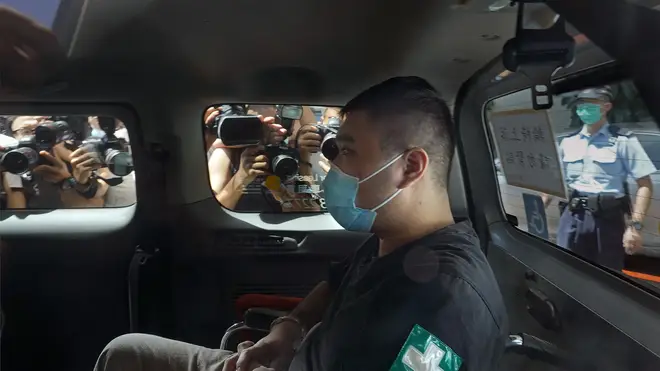
Vanessa Feltz 3pm - 6pm
27 July 2021, 10:04

Tong Ying-kit was accused of driving his motorcycle into police while carrying a flag with the slogan ‘Liberate Hong Kong, revolution of our times’.
The first person to be tried under Hong Kong’s sweeping national security law has been found guilty of secessionism and terrorism in a ruling condemned by human rights activists.
The Hong Kong High Court handed down the verdict in the case of Tong Ying-kit on Tuesday.
The 24-year-old was accused of driving his motorcycle into a group of police officers while carrying a flag bearing the protest slogan “Liberate Hong Kong, revolution of our times” on July 1 last year, a day after Beijing imposed sweeping national security legislation on Hong Kong following months of anti-government protests in 2019.
The verdict was closely watched for indications of how similar cases will be dealt with in the future. More than 100 people have been arrested under the security legislation.

Tong pleaded not guilty to charges of inciting secession and terrorism, and an alternative charge of dangerous driving.
He faces a maximum sentence of life in jail, but his lawyers are expected to argue for a lighter punishment at his sentencing hearing on Thursday.
Reading the verdict, Justice Esther Toh said Tong “committed terrorist activities causing or intended to cause grave harm to the society” in pursuit of a political agenda.
His behaviour was an act of violence aimed at coercing the central and Hong Kong governments and intimidating the public, she said.
Carrying the slogan-bearing flag constituted an act of incitement to secession, she added.
Because the prosecution was certain that it had proved “each and every element” of the terrorism and secession charges, it decided not to proceed with the dangerous driving charge.
Tong did not speak during the reading of the verdict. He waved to his parents and others in the gallery as he was escorted from the chamber.

The trial, which ended on July 20, was held in the High Court with no jury, under rules allowing the exception from Hong Kong’s common law system if state secrets need to be protected, foreign forces are involved or if the personal safety of jurors needs to be protected. Trials are presided over by judges handpicked by Hong Kong leader Carrie Lam.
Tong’s defence lawyer had said it was impossible to prove that Tong was inciting secession merely by having used the slogan.
The defence also said there was no evidence that Tong committed the act deliberately, that he avoided crashing into officers, and that his actions could not be considered terrorism since there was no serious violence or harm to society.
The verdict was immediately condemned by Amnesty International, which called it “the beginning of the end for freedom of expression in Hong Kong”.
Asia-Pacific regional director Yamini Mishra said: “People should be free to use political slogans during protests, and Tong Ying-kit should not be punished for exercising his right to free speech.
“It is particularly clear that he should never have been charged with a ‘national security’ offence carrying a possible life sentence.”

While Hong Kong has its own Legislative Council, Beijing’s ceremonial legislature imposed the national security law on the semi-autonomous city after it determined the council was unable to pass the legislation itself because of political opposition.
That followed increasingly violent 2019 protests against China’s growing influence over Hong Kong’s affairs, despite commitments to allow the city to maintain its own system for 50 years after its 1997 handover from British colonial rule.
China’s legislature has mandated changes to the make-up of the city’s Legislative Council to ensure an overwhelming pro-Beijing majority, and required that only those it determines “patriots” can hold office.
Authorities have banned the protest slogan “Liberate Hong Kong, revolution of our times”, stating that it has secessionist connotations. Library books and school curricula have also been investigated for alleged secessionist messages.
Hong Kong’s last remaining pro-democracy newspaper, Apple Daily, was forced out of business last month and a court denied bail for four editors and journalists held on charges of endangering national security as part of the widening crackdown.
Beijing has dismissed criticisms, saying it is merely restoring order to the city and instituting they same type of national security protections found in other countries.